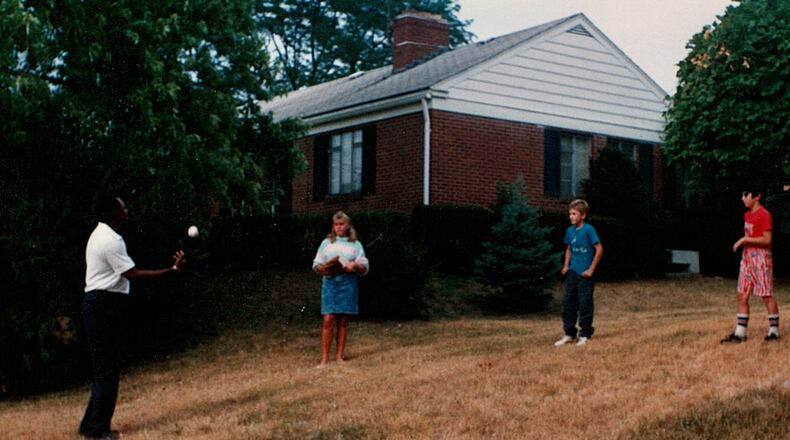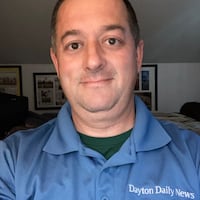A year later, in Vero Beach, Fla., where I had my first full-time newspaper job, I visited former Detroit Tigers pitcher Elden Auker, the last pitcher to strike out Babe Ruth in 1935, at his home to talk about the closing of Tiger Stadium. He had just got off the phone with Ted Williams when I walked into his office.
Closer to home, I remember an interview with Dave Burba at a Perkins in Springfield to talk about the end of his 15-year pitching career in 2005, and I treasure the many interviews with another Springfield native and Kenton Ridge graduate, Adam Eaton, who I’ve written about from 2004, when he was a freshman in high school, to the present day.
In 11 seasons covering the Reds, many moments stand out: a butt pat from Todd Frazier, who loved chatting with photographers shooting the game; Dusty Baker marveling at my giant cameras; and a brief one-on-one with Joey Votto in a despondent clubhouse after the Reds were eliminated by the San Francisco Giants in 2012.
This story, however, is about the first big leaguer I ever met, a man I’ve jokingly called Uncle Tony when mentioning him to my friends over the years. He’s Tony Oliva, and he’s going into the Baseball Hall of Fame today in Cooperstown, N.Y. It’s a long-delayed honor for a Minnesota Twins great — a Rookie of the Year in 1964 and a three-time American League batting champion — who finally got enough votes from the Golden Era Committee in December.
In 1988, Oliva was a hitting coach for the Minnesota Twins when he visited my family in Kettering after the All-Star Game in Cincinnati. I was 11.
The reason for the visit was a family connection. Oliva, a native of Cuba, married Gordette Dubois in Hitchcock, S.D., in 1968. They met 3½ years earlier when Gordette attended a Twins game while on a senior class skip day.
Gordette is the daughter of Robert and Lura Dubois. Robert was the brother of Grace (Dubois) Leary, my great grandma, who grew up in South Dakota but lived most of her life in Dayton. Her husband Dan was a dean of education at the University of Dayton in the 1940s.
Grandma Grace, my mom Mary’s grandma, lived on Laurelwood Road in Kettering. That’s where Tony and Gordette Oliva visited us in 1988. My grandpa, Dr. Jim Leary, helped arrange it.
I remember seeing Oliva’s World Series ring. It was huge — and also fresh because the Twins had won the World Series the previous fall. He won another one in 1991 as the Twins bench coach.
I played catch with Oliva in the backyard with my cousins Jennifer and Sean. I wore colorful jam shorts that I regret 34 years later. Sean remembers driving to Riverfront Stadium with my uncle David Leary to pick up the Olivas and bringing them to Dayton.
Later, Tony and Gordette ate dinner with us at Vito’s Venice Inn on East Dorothy Lane. I was too young to stick around for all the baseball stories told at the table and only remember hanging out in the parking lot with my cousins, but I’m sure everyone heard about Oliva’s experience at the All-Star Game at Riverfront Stadium. As a coach of the defending World Series champions, he helped coach the American League team with Twins manager Tom Kelly.
Tony Oliva, who I’ve met twice, once in 1988 in Kettering and then years later at a Dodgertown fantasy camp, finally makes the Hall of Fame. https://t.co/G2xQyV4H6B pic.twitter.com/BAaMzsqLmG
— David Jablonski (@DavidPJablonski) December 6, 2021
Oliva happened to be pictured in the Dayton Daily News on the Monday of All-Star week. A Charlie Steinbrunner photo showed him signing autographs as fans reached over the rail at Riverfront. They had an old-timer’s game back then. Oliva, then 50, played alongside Cleveland great Larry Doby, Twins great Harmon Killebrew and against National League stars such as Lou Brock, Johnny Bench and Tony Perez.
What I didn’t know about my family’s Oliva connection until starting this story is that he visited the family once before I was born. My uncle Robert Leary remembered him and Gordette coming to my grandparents Jim and Josie Leary’s house on Bigger Road in Centerville sometime in the 1970s.
“It was in the summer, and I was actually big into baseball,” Robert said. “I still remember I had a mitt. It was a Rawlings. It was aqua blue. I thought it was the coolest thing in the world. I had used the mink oil on that thing, and it was so loose and slippery sometimes that when I would catch with it, the glove would actually fall off my hand. I remember Tony laughing about that when he saw my mitt. He’s like, ‘That’s that’s an attractive mitt, young man.’ We ended up tossing with him in the backyard, which is pretty historic and pretty cool. I knew he was a big-league player and everything, but I didn’t know how big.”
My uncle David remembers collecting Tony Oliva’s baseball cards and was at that early visit at Bigger Road as well as the dinner at Vito’s. He also saw Oliva in between those visits while on spring break in Florida. This happened at Dodgertown in Vero Beach.
“I got a message to one of the staff members of the Twins and sent him a handwritten note,” David said. “He came out after the game and talked with us.”
Ironically, I crossed paths with Oliva decades later at a fantasy camp at Dodgertown, where I got to talk to many of the old Boys of Summer — Duke Snider, Ralph Branca, Carl Erskine, etc. — during my time the Vero Beach Press Journal. I told Oliva I met him in 1988 in Dayton, and he said, “The doctor’s family?” He remembered.
Robert has even better story of running into Oliva. When the All-Star Game was held in Seattle in 2001, he was there on a business trip and was sitting in a hotel talking to colleagues as former big leaguers, like Joe Morgan, walked past. Robert brought up the family connection to Oliva. No one believed him. Five minutes later, Oliva himself happened to pass by. Robert got up to say hi and got a big hug.
In recent decades, my family watched as Oliva fell just short of the hall of fame again and again. I mailed some postcards on behalf of the #VoteTonyO campaign in 2014. He missed induction by one vote that year. Earlier, the highest percentage of votes Oliva got from the Baseball Writers Association of America was 47.3% in 1988, the same year he visited us in Kettering.
Finally, the call came in December from Jane Forbes Clark, the chairwoman of the National Baseball Hall of Fame and Museum. It’s big news for the Twins, the only big-league team Oliva ever played or coached for in his career. It’s an honor, Oliva, now 84, shares with everyone.
“The biggest thing for me is how people react,” Oliva told the Star-Tribune in Minneapolis. “How happy they are for me. Young people. Middle-aged people. People my age. Everybody. It’s unbelievable. They go out of their way to tell me congratulations. I’m having this experience with many, many people.”
Including, myself.
Credit: Jeff Wheeler
Credit: Jeff Wheeler
Credit: William Seaman
Credit: William Seaman
About the Author





